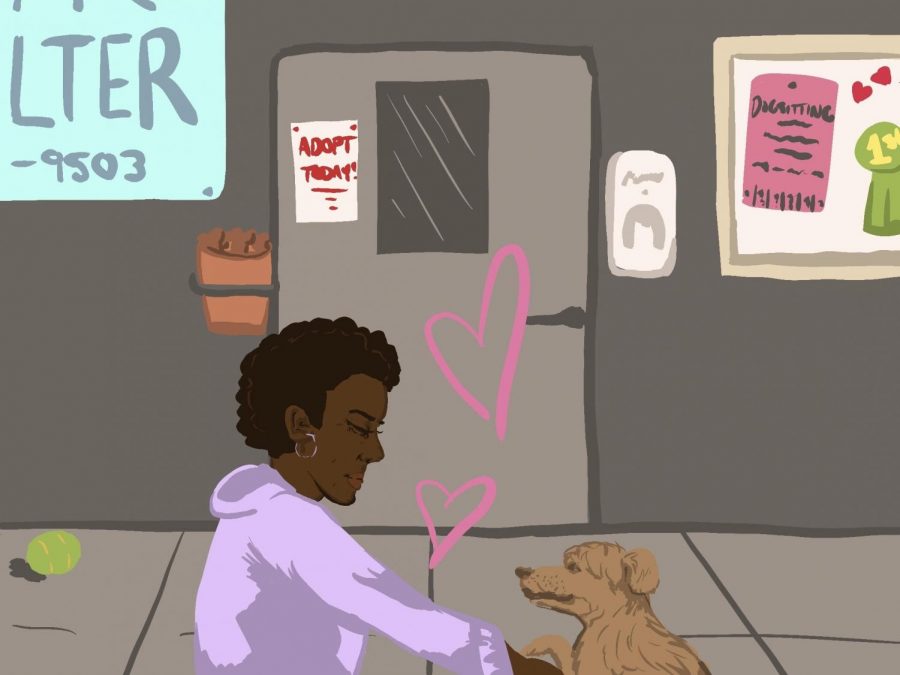OPINION: COVID has silver lining for humane societies, new pet owners
Humane societies use this time to improve adoption processes, cater to more sensitive animals
A light in a dark tunnel, finding a companion for these animals during times like this makes working in animal shelters well worth it.
January 27, 2021
Humane societies work tirelessly for the benefit of their animals all across the country, and there’s often more of a link between them than people think. For instance, when a dog or cat has spent too much time un-adopted at one facility, a rescue center with space for a transfer can welcome them into a new community for a fresh start.
The Benton-Franklin Humane Society in Kennewick, Washington, has its own name for this part of the adoption process: Happily Ever After.
“That way they just get fresh eyes, a new venue … and their potential to be adopted grows,” said Elizabeth Lech, Benton-Franklin’s executive assistant and Happily Ever After coordinator.
The pandemic has driven many businesses to close their doors to the public, and humane societies are no different. However, Benton-Franklin took the opportunity to focus on one of their main goals as an organization: providing the best care for their animals.
Benton-Franklin hired Amber Zawrotny as shelter services supervisor five months ago to support this goal. Zawrotny is what Lech would call “an animal behavior nerd” — in the best way.
Animal shelters can be some of the most stressful environments for dogs and cats alike. Unfamiliar faces pressed against cage doors, foreign smells with every opened door … everything is overwhelming for the pets waiting for their next home.
For those like Zawrotny, who are focused on animal behavior, the closing of what they call the “Kennewick petting zoo” was actually a blessing in disguise.
“Our kennels have never been so quiet. We don’t have people going in and triggering our more anxious dogs pretty much every day,” Zawrotny said. “[Shelters] have been able to get more shy and fearful dogs the care that they need in order to succeed.”
One might imagine the closing of the shelter’s doors might lead to fewer adoptions, but those at Benton-Franklin have found it actually allows for a better adoption process to be established.
“People can still view available animals and call in. Adoptions are still happening on-site. We don’t really believe in virtual adoption … you have to meet the animal,” Zawrotny said. “You have to kind of see if you have any connection with them.”
The pandemic and dwindling foot-traffic in animal shelters surely changed the attitude of adoptions. Rather than seeing someone find an adorable animal to then commit on a whim, people are calling and working with staff to talk about what kind of animal they are looking for and working from there.
For Pullman’s animal shelter, Whitman County Humane Society, the pandemic enabled them to find more homes for animals than any year before.
“Once we were able to open up for adoptions again, our adoption rates skyrocketed,” Shelby Vasquez, assistant director of shelter operations, wrote in an email.
Like WCHS, Benton-Franklin has been able to provide additional support for their adopters post-adoption as well.
“We’re doing check-ins now regularly, sending follow-up emails,” Lech said. “So now, not only is that initial process strung out, and more effort is put in by the adopters, but because of these additions to our team and a concentration of our mission, we are supporting our adopters more and setting them up for success.”
Similar to WCHS, Benton-Franklin and many more animal shelters across the state, this process has opened the door for a more honest conversation between adopters and staff.
“Adopters are always allowed to call us and ask for tips, tricks, advice, etc.,” Vasquez wrote in an email. “We are always more than happy to be a resource to the community. Especially adopters!”
In many cases, new adopters can be overwhelmed with the responsibility of a new pet and be afraid to ask questions. Rather than admitting problems or returning their pet, they will dump them, which starts the process all over again.
“The impulse [to adopt on a whim] has been driven way down because these extra steps have been added,” Lech said.
This process will hopefully result in fewer dumped pets and more happily-ever-after emails sent back to Benton-Franklin with pictures of their beloved pets lounging on their new living room thrones.
Whether the pandemic continues to require a closed-door policy from our local humane societies or not, these hard-working animal-lovers will continue to educate new pet owners and care for their animals, big or small, nervous or outgoing.
Note: Our local animal shelter, Whitman County Humane Society, is in need of community donations. If you are willing and able, they specifically need:
- Nutri-Cal Puppy Dietary Supplement
- Bleach
- Puppy food (wet and dry)
- Paper towels










